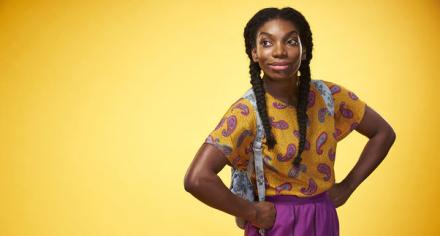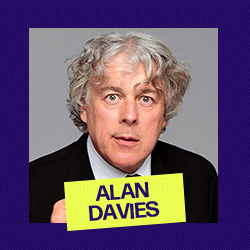
For those who missed series one of Chewing Gum, explain a little bit about the show.
The show is centred around a girl called Tracey Gordon, who lives in Tower Hamlets, and it’s about her upbringing, which is a very Pentecostal, evangelical life. She decides, at 24, that she wants to have a more normal life, so it’s about adolescence ten years too late. It explores friendship, sexuality, relationships, jobs, class, everything.
Series one was a massive success, and won a clutch of awards. Were you prepared for that?
I was very surprised whenever I was nominated for something – VERY SURPRISED – but once you’re nominated, you have to see it as a realistic possibility. I never understand people who go up and cry when they win an award. I’m like “Well, you were nominated, you were one of four!” I’d rather just take it in my stride and go “Okay, back to work.”
How did you handle it? How can you have that type of success and ensure it doesn’t go to your head?
When you watch the BAFTAs and things on TV they look like such a big deal, but when you’re just one person sat in a chair, and you have to go down some stairs and pick up something, and then go back up the stairs, and then you go to bed in the same house you were in before, it’s all very normal. And the day after the BAFTA I went to Berlin to write the second series, so now it all just feels a bit like a strange dream. That amazing thing happened, but then you have to go back to work.
Series one was so good, did you feel a sense of pressure to make the second series as good as the first?
No. I mean, I’m sure, at times, I must have felt that, but overall I kept reminding myself that the process of writing TV, and acting and producing, has got to be partly for myself. I wanted to push myself as a writer and performer, and I can’t be afraid to fail. So I might not get any awards for season two, but I have to see it that I’m trying to grow as an artist.
When we left Tracey at the end of the last series, she’d been kicked out by her mum. Where do we pick things up?
She’s been kicked out by her mum, and then by her best friend, who she went to live with in the final episode. The very last scene is her and Connor walking off into the distance with bin bags containing the only belongings that they were taking with them. In the second series, I had to bring it back to the estate, because I don’t like strange environments – that place is my comfort zone. It’s around two-and-a-half months later, and we’re just seeing what’s happened in the relationship between Connor and Tracey. And the rest is back as we were, with her friends, with the estate people, and with Tracey trying to navigate her way through life.
Have relations improved at all with her sister?
Yeah, with her sister and with her best friend. But the marriage thing wasn’t really her fault – or maybe I’m just taking sides because I play Tracey!
How has Tracey grown up on an estate in central London and reached the age of 24 while remaining so naïve?
That’s church, isn’t it? I can honestly say the exact same thing for myself. I was a Christian for five years, I became a Christian when I turned 17 or 18, until I was 23, which is really the period of your life where you lose all of your naivety. I didn’t, because I was in this amazing bubble of happy Christian people. We went to Christian parties, we went to Christian libraries, we read Christian books, we listened to Christian music, we went to Christian places. You practice to keep hold of that naivety, but it’s very possible – it’s just not the mainstream world that we know.
As you allude to, aspects of the show are autobiographical. What do your family make of the show?
My family are really proud! I’m actually surprised at how proud they are, because my mum and my sister are both very strong Christians – although not Christian in the way that I portray Christianity in the show. They know that I am a little bit out there. My mum is really proud – I took her with me on the Jonathan Ross Show.
You can’t have a trace of vanity when you’re playing Tracey. Is it ever tough to do that?
To play these crazy, disgusting things like vomiting all over myself? You know what? No. Surprisingly not. It may be just to do with the person I am. I’m not afraid to be ugly and gross. I think, also, I have a desire to stimulate people and make them uncomfortable. I’m sure I have a line, but maybe my line is slightly further down than other people’s. There are things that I am willing to do to make people laugh or to make people uncomfortable that might be seen as quite shocking by other people.
It’s not a show about the agony of poverty, is it? Did you intentionally make it quite upbeat and optimistic?
Yes, and that’s simply because I was hired to write the show by a production company that was a comedy production company. As a writer, you write to the spec, and that was the spec – it was a pretty broad spec, it was just “Please, not too much sadness.” And I’m quite glad that that’s the route I went down. But the play which the series is very loosely based on, was a very dark comedy, it went to quite dark places, and I took those out for the TV show. I still hope people look at Tracey’s life and occasionally think “Wow, she’s quite poor!” or “Wow, she’s probably a little bit fucked, isn’t she?” But it’s not something that I really need to hammer home. Just by seeing the estate – and in the second series, we’re going to go into some characters’ rooms that you’ve never seen before – and if you look at the way it’s been designed, there’s a lot of things I don’t need to say.
Where are the outdoor scenes filmed? What do the locals make of it all?
The exteriors are filmed in Holloway. This year, actually, the interiors are all in a studio – luckily, you can’t really tell, because we had done interiors in actual flats in Ealing. So we copied the exact same thing for the studio.
What did the locals make of you filming it all?
It was kind of amazing. They aren’t there screaming, going “Tracey!” or going “Get lost!” They’re just a bit more like “Oh, you alright, Tracey?” and they walk on, literally as if I live on the estate. They don’t bat an eyelid. With filming, occasionally a kid will come, and I’ll take a photo and have a chat with the kid. But we don’t need loads of security or anything. It’s almost as if we’ve just always been there.
How has your life changed in the last year?
Hmmm. Maybe I can’t always go everywhere that I wanted to go. If I go into a café, it might be a different experience than it would have been a year-and-a-half ago. It means that I work more, and I don’t have as much time for friends as I used to. But those are the only two things I can think of that have changed.
Series one is available worldwide on Netflix. How has it gone down in other countries?
Well, I have friends of friends, and friends who live abroad who have said delightful things. And in the beginning, when it first went out on Netflix, I was able to keep up with tweets, and I received tweets in all different languages, saying really positive things about the show, and the fact that there was a weird, quirky person that girls can identify with. But now it has gone so big that I can’t actually keep track of anything on Twitter anymore. But I recognise that that is a good thing.
Interview supplied by C4.




